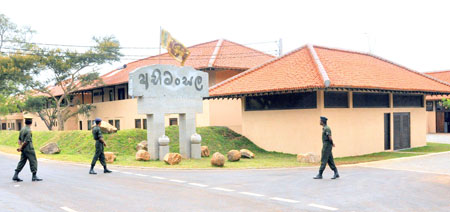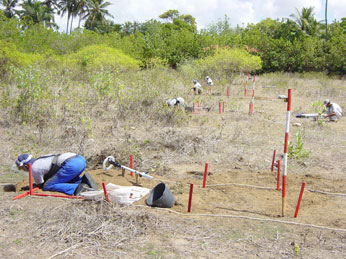|
Opinion:
UNHRC probe: Indian stance commendable
by K.M.H.C.B. Kulatunga
India, which had supported the first two US-led Resolutions against
Sri Lanka in 2012 and 2013 to the United Nations human rights body, has
finally taken the right decision by deciding not to support the
controversial UNHRC probe against Sri Lanka on alleged human rights
violations.
 |
| The battle against
terrorism was won with great sacrifice by the Security Forces.
Abimansalas (wellness resorts) have been set up to house
Security Forces personnel who were permanently maimed.
Pic: Sudam Gunasinghe |
The new Indian Government, headed by Prime Minister Narendra Modi,
will not support the UNHRC probe into alleged human rights violations
during the final phase of Sri Lanka's battle against terrorism.
External Affairs Minister Prof. G.L. Peiris had a fruitful meeting
with his Indian counterpart Sushma Swaraj recently during which India
has made it clear that it would uphold the objection to a UN probe that
India had articulated in April while abstaining from voting for the
Resolution against Sri Lanka.
Significant
India is of the view that international bodies need to address human
rights concerns in a cooperative manner with the countries concerned,
and not in a punitive manner. Sushma's message to Peiris is significant
because the BJP had, in the run-up to the Lok Sabha elections,
criticised the previous UPA government headed by the Indian Congress
Party, for what it dubbed a soft foreign policy attitude towards
Colombo.
When India abstained from the UN vote against Sri Lanka in April, the
Tamil Nadu BJP accused the Congress-led central government of ignoring
the concerns of Sri Lankan Tamils. According to the Telegraph, India was
uncomfortable with the UNHRC vote because it advocated an independent
international investigation on alleged war crimes by Sri Lanka's
Security Forces. New Delhi feared, the same yardstick could be used
against it on the Kashmir issue, The Telegraph report added.
Whatever the reasons, all Sri Lankans would warmly welcome the Indian
stance of supporting Sri Lanka to keep the UNHRC investigators at bay.
It will be a big setback to the UNHRC as they would now be compelled to
think twice about implementing such a controversial decision not only
against the country concerned - Sri Lanka, but also against the wishes
of the big brother in the region.
Sinister elements
 |
|
Demining operations in the
North are nearing completion |
The US was feeling extremely comfortable in bringing the first two
resolutions against Sri Lanka at the UNHRC with the all-important
backing of India but suffered a major setback when India abstained from
voting at the third resolution against Sri Lanka.
The bold and courageous decision of India to stand up for its South
Asian neighbour would go a long way, opening the eyes of the US and its
allies. Britain, which was the major ally of the US in bringing the
Resolution against Sri Lanka should now think twice whether their
decision would boomerang on them.
India and Sri Lanka are two of the many countries invaded by Britain
in the 19th century, killing thousands of Indian and Sri Lankan
civilians. If the UK is sincerely worried about human rights, they
should first and foremost hold a credible investigations to the war
crimes they had committed at least in India and Sri Lanka.
The appointment of an Advisory Council to the Commission of Inquiry
by President Mahinda Rajapaksa and the landmark judgement in the Khuram
murder case are two important incidents which should open the eyes of
the international community. The sinister elements in the West which
always try to paint gloomy picture on Sri Lanka should have a closer
look at these developments which proves the commitment of the executive
towards national reconciliation and the impartiality of the country's
judiciary.
Twenty years
Former Tangalle Pradeshiya Sabha Chairman Sampath Chandrapushpa
Vidana Pathirana and three others found guilty of the murder of British
tourist Khuram Sheik and of raping his Russian girlfriend Victoria
Alexandrovna were last week sentenced to 20 years rigorous imprisonment
on each of the two counts. The tragedy had occurred at the Tangalle
Resort on December 24, 2012.
Colombo High Court Judge Rohini Walgama sentenced the accused Lahiru
Kelum, Saman Deshapriya, former Tangalle PS Chairman Sampath
Chandrapushpa Vidana Pathirana and Prageeth Chaturanga for 40 years RI
on the charge of murder and rape with the jail terms to run
concurrently.
President Rajapaksa appointed an Advisory Council to the Commission
of Inquiry, comprising of three legal luminaries - with Right Hon. Sir
Desmond de Silva as the chairman of the council along with Sir Geoffrey
Nice and Prof. David Crane. The Commission of Inquiry appointed vide
Gazette Notification 1823/42 dated August 15, 2013 is mandated to
inquire and report on the matters that have been referred in paragraph
4. 359 to in the Report of the Lessons Learnt and Reconciliation
Commission (LLRC).
Lesson
The Advisory Council is tasked with advising the Chairman and Members
of the Commission of Inquiry, at their request, on matters pertaining to
the work of the Commission. Hence, the appointment of the eminent panel
is another bold step taken towards national reconciliation and winning
the hearts of Tamils.
Sri Lanka's success story in its battle against terrorism teaches a
perfect lesson to all those 'big countries' which are still trying to
eliminate terrorism in the West. Upholding national, regional and global
security is a tremendous responsibility, and adequate safeguards are
required to curb the threats posed by various non-state actors.
One of the most critical strategies that nations can employ to
eradicate terrorism is to increase cooperation with each other on this
issue through bilateral and multilateral mechanisms.
The Lankan Government has also recently worked with the Governments
of India and the Maldives on setting up a trilateral agreement for
cooperation in the maritime domain. Under this agreement, which is now
being considered for expansion to the Seychelles and Mauritius, there
will be sharing of information to enhance maritime domain awareness,
technical cooperation on the tracking of vessels, coordination of
maritime search and rescue, and greater cooperation on curbing illegal
activities such as drug trafficking, people smuggling and sea piracy. If
we are united in the region, no external power in the West could
threaten the peace and stability in the region.
Leadership
Although we now enjoy the rich dividends of peace, it is important
that we do not forget the long journey on which we have come, as pointed
out by Defence Secretary Gotabaya Rajapaksa in one of his recent
speeches. The battle against terrorism was a hard fought, difficult one
that required tremendous leadership, courage and great sacrifice.
In less than five years after the end of the battle against terror,
the Government has accomplished a great deal of work to restore normalcy
and stability to the country. Nearly 300,000 internally displaced
persons who had been kept with the LTTE as a human shield had to be
looked after in welfare camps. As at today, almost all of them have been
resettled in their places of origin. This was possible through the
comprehensive demining program that was carried out in their towns and
villages within a very short period. As demining was completed in each
area, the IDPs were resettled.
Another key issue in the restoration of normalcy was dealing with the
12,000 former LTTE cadres who had surrendered or were captured by the
Security Forces, and the nearly 5,000 LTTE members who had been detained
during the war. As at today, nearly all of these cadres have been
rehabilitated and reintegrated to society. Only a few who were involved
in LTTE activities at the highest level are being prosecuted for their
crimes.
Terrorists
One of the key focuses of the Government after the restoration of
peace and stability has been the rapid reconstruction of the North and
the East. A staggering amount of funds has been spent on the
reconstruction of roads, railways, electrification, irrigation, water
supply and sanitation. Healthcare, education, social and community
facilities have been uplifted and the housing stock has been
considerably improved. This are the positive factors the West should
consider rather than continuing to harp of the human rights of the LTTE
terrorists killed in action.
The LLRC that was appointed to look into the reasons for the
grievances of the people living in the North and the East, has made a
slow but a determined progress. The West should not expect Sri Lanka to
perform miracles after ending a three decades long battle against the
LTTE terror outfit. A great deal of work has been done with regard to
rebuilding national unity.
After an exhaustive and lengthy process in which people in all parts
of the island were given an opportunity to testify, the Commission has
come up with several recommendations that were made public December 16,
2011. The major portion of these has already been implemented while
others are presently being executed in order to foster reconciliation
and ensure lasting peace.
Progress
All these actions have been taken on the initiative of the
Government, under the guidance of the President. Sri Lanka is a
sovereign nation and its democratically elected leaders are skilled and
experienced.
The country has a trusted systems which ensures democracy, one of the
oldest in Asia.
The Government will continue to foster the nation's development and
post-terrorism progress in accordance with the needs of its people. In
this context it is rather unfortunate that there are opportunists who
seek to take country's domestic issues before other nations and
international fora for their political and personal gain.
If they are sincere genuine in resolving such issues, they should
first and the foremost engage with the Government through domestic
institutions and fora instead of trying to internationalise our internal
affairs. No foreigner could have a greater pain on Sri Lankans than our
own leaders.
A section of the international community is making a desperate
attempt to force its own agenda on Sri Lanka. Despite the tremendous
progress that the country has achieved in just five years after the end
of the LTTE terror, these international elements are unfairly and
harshly critical of Sri Lanka. The West can't expect Sri Lanka to
perform miracles overnight, something no other country has achieved
after a similar situation in the battlefront. |

